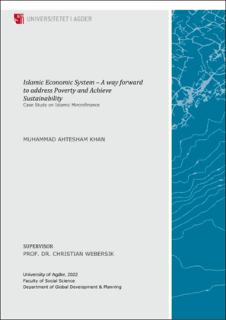| dc.description.abstract | With every tenth person on the planet living under extreme poverty and the Covid-19 pandemic has further exacerbated the situation due to the deteriorating economic conditions resulting in increased layoffs and joblessness. On the other hand the concentration of global wealth being continuously converged into the hands of few of the elitist segment due to the inherent impediments that the capitalistic economic model offers. Can this system sustain or it’s high time to find better alternates? This study is an attempt to find better economic approaches stemming from the higher ethical grounds and are more sustainable to tackle the menace of poverty and income inequalities targeting bottom of the pyramid. For this purpose the study closely examines the microfinance model, its various interventions over the last few decades and the impact it brings to the society in achieving shared prosperity for all. More particularly the role of Interest Free Islamic (often referred as ethical) microfinance, and see whether the model of micro-lending works or not as a vehicle to generate economic activity in the form of small / micro/ nano enterprises which not only is ethically enriched but is equally sustainable.
Keywords: Pandemic, Deteriorating, Interest Free Microfinance, Sustainable, Economic-Activity, Small Enterprise | |
